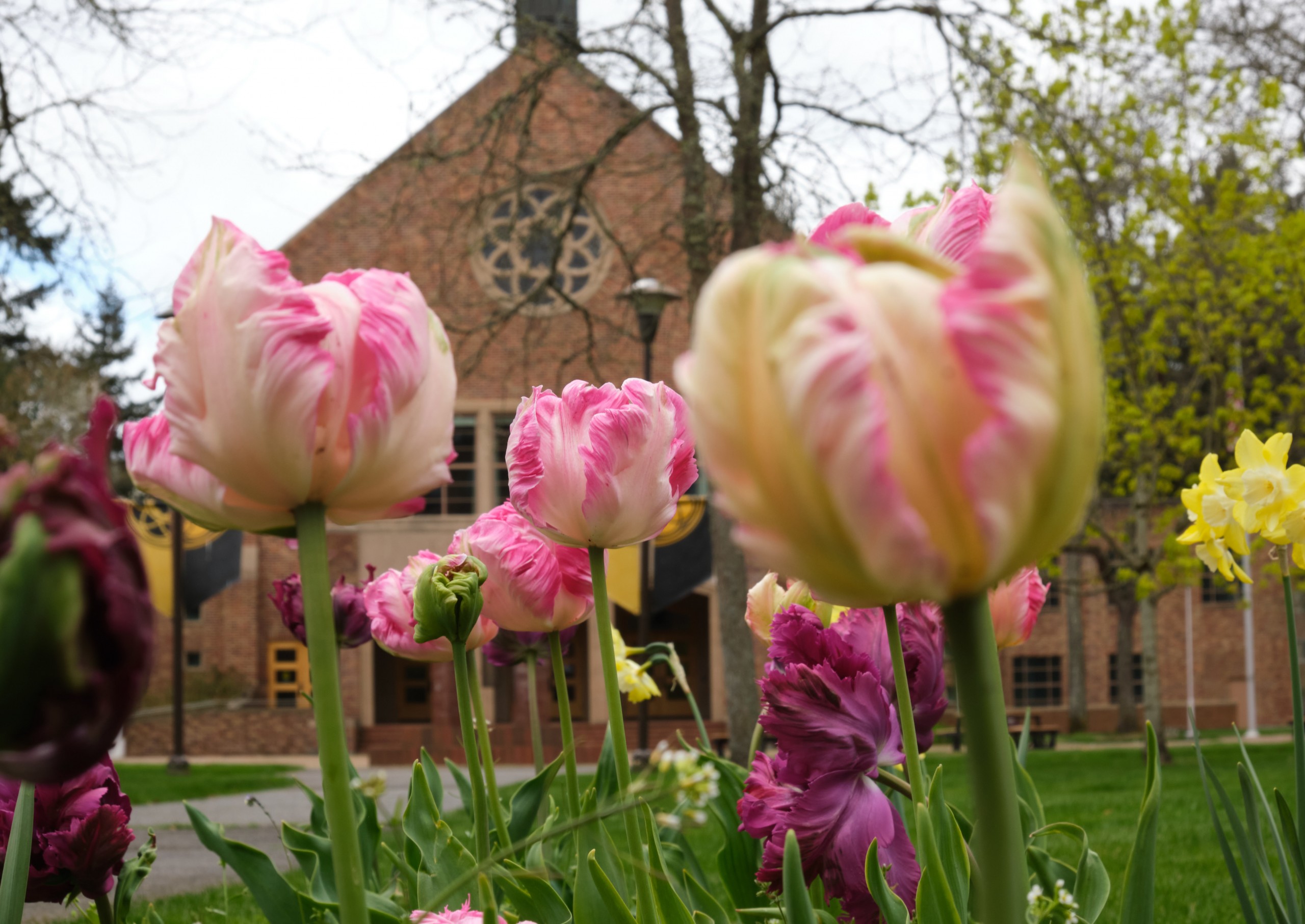Disruption and Continuity: PLU’s Division of Humanities in Spring, 2020

Image: Spring blooms on the fairly empty campus due to the corona virus pandemic Tuesday, April 21, 2020, at PLU. (Photo/John Froschauer)
By Kevin J. O’Brien
Dean of the Division of Humanities
This school year concludes amidst global disruption. The COVID-19 pandemic changed nearly everyone’s life, and far too many of us are mourning losses in our families and friends, dealing with economic hardship, and still dealing with anxieties about what might come next.
PLU’s curricular disruption became official on March 7, with the announcement that all classes would move to remote learning. Over the following weeks, faculty and students adjusted, those studying away returned home early, and we all learned more than we had planned about videoconferencing. This has been a season of disruption.
However, PLU’s Division of Humanities worked hard in this time to continue the most worthwhile aspects of our work, innovating new ways to achieve our mission: educating students to engage—creatively, critically, and empathetically—with what it means to be human across the sweep of history, in diverse cultures and environments.
Associate Professor of Religion Erik Hammerstrom re-imagined a concluding assignment for his course on the Religions of China to re-create a debate from the throne room of Emperor Wuzong in the year 841. The debate concerned how to balance Daoist, Buddhist, and Confucian ideas in Chinese culture, and students were assigned roles and positions to take. They wrote their cases, developed rebuttals to their opponents, and voted on a winner. In Professor Hammerstrom’s course, the Confucians won the debate, as they did in real life centuries ago. However, things were a little more split in the class, as the real Emperor Wuzong banned Buddhism outright, while the class only imposed a new tax and a restriction on temples.
Tyler Travillian, Associate Professor of Classics, also created an innovative assignment for remote learning. His students in the International Honors Course “Liberty, Power, and Imagination” were originally supposed to run a roundtable discussion about the book Frankenstein, in which they imagined historical and literary characters responding to the novel. When that became impossible, Dr. Travillian had the students each write up their ideas and workshop essays with one another. They ended up making the record of their excellent and critical work into what they called a “special edition of The Journal of Frankenstein Studies,” complete with illustrations, book reviews, and responses.
Other faculty engaged the wider community outside the classroom. For example, Associate Professor of English Rona Kaufman, her husband, and their daughter Juniper built community in their neighborhood. Juniper had the idea to share eggs laid by the family’s chickens with neighbors, and started leaving them on a stand at the end of the driveway. Neighbors took the eggs and left gifts and notes behind, creating meaningful exchange and a sense of comfort during social isolation. Such connection between basic human needs for food and community is essential to who we are in the Division of Humanities.
The most important continuity for us was in supporting and celebrating the excellent work of our students. We are especially proud of our graduates. For example, Hispanic studies major Aminda Cheney-Irgens was selected for a Fulbright English Teaching Assistantship in Mexico. Philosophy major Bo Frohock was admitted to the Ph.D. program at the University of South Florida, where he’ll continue his capstone research on continental thought with a focus on Hannah Arendt. English major Madeline Scully is headed to the London School of Economics to complete a Master’s Degree in Gender, Peace and Security. Many other students are similarly planning on excellent graduate programs, internships, and jobs next year. We are proud of every single one of our graduates, and look forward to seeing how they continue living out PLU’s mission.
As I write this, we can’t be certain what Fall of 2020 will look like at PLU, but we are planning to be back on campus and teaching in person. Whatever happens, we in the Division of Humanities are committed to continuity in our teaching, our studies, and our work supporting and building meaningful and humane communities.


